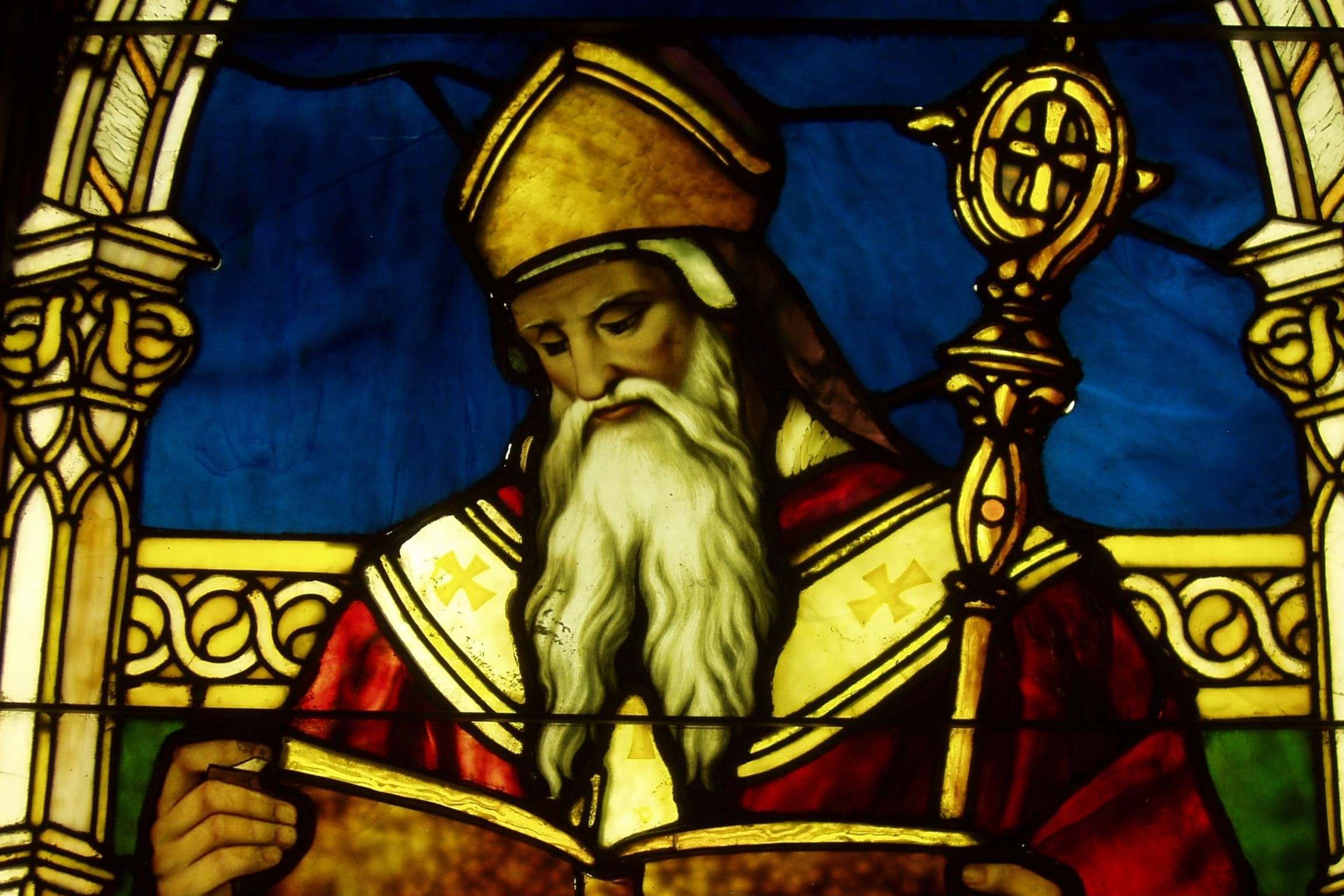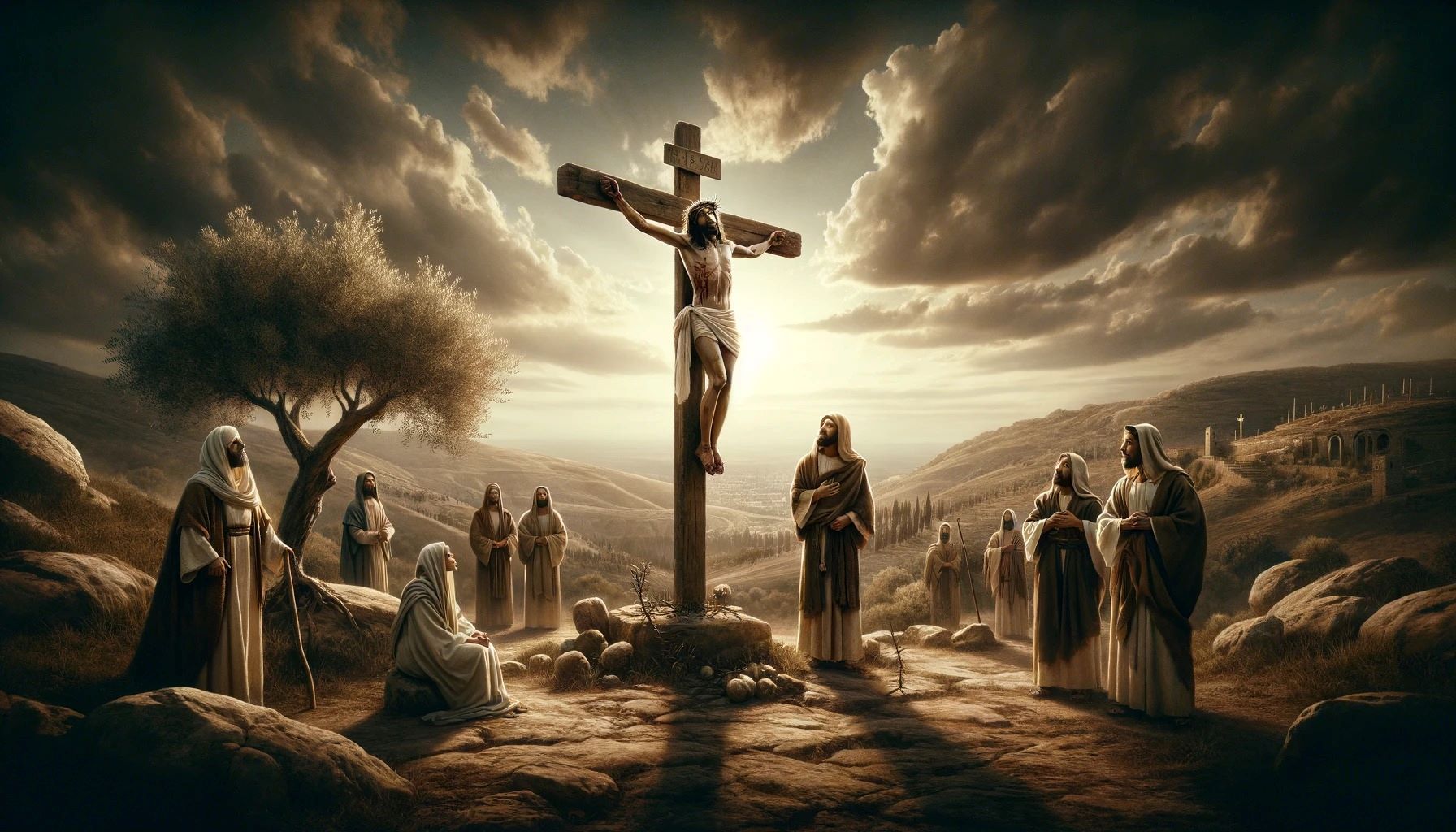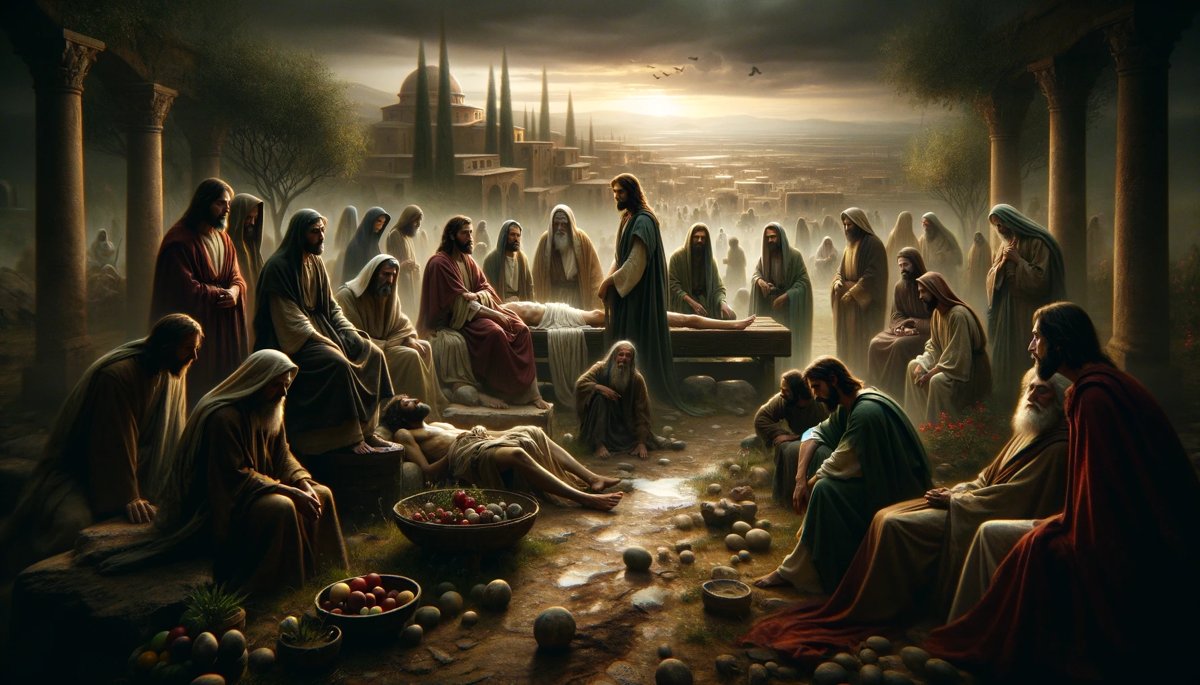Home>Bible Facts>How Did The Apostles Die ?


Bible Facts
How Did The Apostles Die ?
Published: February 19, 2024
Peter Smith, Editorial Director at Christian.net, combines deep insights into faith, politics, and culture to lead content creation that resonates widely. Awarded for his contributions to religious discourse, he previously headed a major organization for religious communicators, enhancing dialogue on faith's societal impacts.
Discover the fascinating and often tragic fates of the apostles as recorded in the Bible. Explore compelling Bible facts about their deaths.
(Many of the links in this article redirect to a specific reviewed product. Your purchase of these products through affiliate links helps to generate commission for Christian.net, at no extra cost. Learn more)
Table of Contents
- Introduction
- The Death of Judas Iscariot
- The Death of Peter
- The Death of James, son of Zebedee
- The Death of John
- The Death of Andrew
- The Death of Philip
- The Death of Bartholomew
- The Death of Thomas
- The Death of Matthew
- The Death of James, son of Alphaeus
- The Death of Thaddaeus
- The Death of Simon the Zealot
- Conclusion
Introduction
The lives and deaths of the apostles are a subject of profound historical and religious significance. These twelve men, chosen by Jesus Christ to spread his teachings and establish the Christian faith, played pivotal roles in shaping the early church. Their unwavering commitment to their beliefs and their ultimate sacrifices have left an indelible mark on the world.
The accounts of the apostles' lives and deaths are primarily documented in the New Testament of the Bible, providing invaluable insights into the challenges they faced and the extraordinary courage they displayed. Each apostle embarked on a unique journey, encountering trials and tribulations as they fearlessly proclaimed the gospel message.
Exploring the circumstances surrounding the deaths of the apostles offers a glimpse into the tumultuous times in which they lived and the unwavering faith that sustained them. Their diverse experiences and the manner in which they met their fates serve as powerful testaments to their dedication to spreading the teachings of Jesus Christ.
As we delve into the individual accounts of the apostles' deaths, we gain a deeper understanding of the profound impact they had on the early Christian community and the enduring legacy they left behind. Their stories serve as a source of inspiration and contemplation, prompting us to reflect on the timeless values of faith, resilience, and unwavering commitment to one's beliefs.
The deaths of the apostles are not merely historical events; they are profound narratives that continue to resonate with believers and scholars alike. By examining the circumstances surrounding their ultimate sacrifices, we honor their enduring legacy and gain valuable insights into the remarkable courage and conviction that defined their lives.
In the subsequent sections, we will embark on a compelling journey through the lives and deaths of the apostles, unraveling the extraordinary stories of faith, sacrifice, and unwavering dedication that continue to captivate and inspire individuals across the globe.
Read more: Why And How Did Paul The Apostle Die?
The Death of Judas Iscariot
Judas Iscariot, one of the twelve apostles chosen by Jesus Christ, is perhaps best known for his infamous betrayal of Jesus. His tragic end is a poignant and sobering chapter in the narrative of the apostles.
Following his betrayal, Judas Iscariot was consumed by overwhelming guilt and remorse. According to the Gospel of Matthew, he returned the thirty pieces of silver to the chief priests and elders, acknowledging his betrayal of innocent blood. Overwhelmed by despair, he tragically took his own life.
The manner of Judas' death is described in the Book of Acts, where it is recounted that he fell headlong, and his body burst open, spilling his intestines. This grim and harrowing account underscores the profound anguish and torment that Judas experienced in the aftermath of his betrayal.
Judas Iscariot's death stands as a haunting reminder of the devastating consequences of betrayal and the weight of remorse. His story serves as a cautionary tale, prompting reflection on the complexities of human nature and the enduring impact of our choices.
While Judas' actions cast a dark shadow over his legacy, his story also offers profound lessons about the complexities of human frailty and the enduring power of redemption. His tragic demise serves as a poignant reminder of the profound consequences of betrayal and the enduring struggle between light and darkness.
The death of Judas Iscariot serves as a somber and thought-provoking chapter in the narrative of the apostles, prompting contemplation on the complexities of human nature and the enduring power of forgiveness and redemption. His story stands as a poignant reminder of the profound consequences of betrayal and the enduring struggle between light and darkness.
Judas Iscariot's ultimate fate serves as a poignant and cautionary reminder of the profound consequences of betrayal and the enduring struggle between light and darkness. His tragic end prompts contemplation on the complexities of human nature and the enduring power of redemption.
The death of Judas Iscariot stands as a haunting and poignant chapter in the narrative of the apostles, offering profound insights into the complexities of human nature and the enduring struggle between light and darkness. His tragic end serves as a poignant reminder of the profound consequences of betrayal and the enduring power of redemption.
Judas Iscariot's tragic demise serves as a poignant and cautionary reminder of the profound consequences of betrayal and the enduring struggle between light and darkness. His story prompts contemplation on the complexities of human nature and the enduring power of redemption.
Judas Iscariot's death stands as a haunting and poignant chapter in the narrative of the apostles, offering profound insights into the complexities of human nature and the enduring struggle between light and darkness. His tragic end serves as a poignant reminder of the profound consequences of betrayal and the enduring power of redemption.
Judas Iscariot's tragic end serves as a poignant and cautionary reminder of the profound consequences of betrayal and the enduring struggle between light and darkness. His story prompts contemplation on the complexities of human nature and the enduring power of redemption.
Judas Iscariot's death stands as a haunting and poignant chapter in the narrative of the apostles, offering profound insights into the complexities of human nature and the enduring struggle between light and darkness. His tragic end serves as a poignant reminder of the profound consequences of betrayal and the enduring power of redemption.
The Death of Peter
The death of Peter, also known as Simon Peter, is a poignant and deeply significant chapter in the narrative of the apostles. Peter, a prominent figure among the disciples of Jesus Christ, played a pivotal role in the early spread of Christianity and left an indelible mark on the faith.
According to historical accounts and biblical narratives, Peter met his tragic end during the reign of the Roman Emperor Nero. Amidst widespread persecution of Christians in Rome, Peter fearlessly continued to proclaim the teachings of Jesus, unwavering in his commitment to the faith he held dear.
Tradition holds that Peter faced martyrdom in Rome, where he was sentenced to death by crucifixion. However, in a profound display of humility and unwavering devotion to his beliefs, Peter requested to be crucified upside down, deeming himself unworthy to die in the same manner as his revered teacher, Jesus Christ.
The death of Peter stands as a testament to his unyielding faith and unwavering commitment to the Christian message. His willingness to endure persecution and embrace martyrdom rather than renounce his beliefs serves as a powerful example of steadfast devotion and courage in the face of adversity.
Peter's ultimate sacrifice embodies the timeless values of faith, resilience, and unwavering commitment to one's beliefs. His unwavering dedication to the teachings of Jesus Christ, even in the face of imminent death, continues to inspire and resonate with believers across the globe.
The death of Peter serves as a poignant reminder of the profound sacrifices made by the early proponents of Christianity and the enduring legacy they left behind. His unwavering faith and steadfast resolve in the face of persecution stand as a testament to the transformative power of belief and the enduring impact of his contributions to the Christian faith.
Peter's legacy endures as a symbol of unwavering faith and unyielding commitment to the principles he held dear. His ultimate sacrifice serves as a powerful reminder of the profound impact of his teachings and the enduring legacy of courage and devotion that continue to inspire generations of believers.
The death of Peter stands as a poignant and sobering chapter in the narrative of the apostles, offering profound insights into the enduring legacy of faith, sacrifice, and unwavering dedication that continue to captivate and inspire individuals across the globe.
The Death of James, son of Zebedee
The death of James, son of Zebedee, one of the twelve apostles chosen by Jesus Christ, is a poignant and deeply significant chapter in the narrative of the early Christian church. James, along with his brother John, was among the inner circle of disciples who shared intimate moments with Jesus, witnessing his transfiguration and the profound miracles he performed.
According to historical accounts and biblical narratives, James met his tragic end at the hands of King Herod Agrippa I, who sought to persecute and suppress the burgeoning Christian community. In the Book of Acts, it is recorded that Herod Agrippa I, in an attempt to curry favor with the Jewish religious authorities, ordered the execution of James by the sword. This ruthless act of persecution marked a significant turning point in the early spread of Christianity and served as a harrowing testament to the challenges faced by the apostles in their unwavering commitment to the faith.
James' martyrdom stands as a testament to his unyielding faith and steadfast devotion to the teachings of Jesus Christ. His willingness to endure persecution and embrace martyrdom rather than renounce his beliefs serves as a powerful example of unwavering commitment and courage in the face of adversity. His ultimate sacrifice embodies the timeless values of faith, resilience, and unwavering dedication to one's beliefs, leaving an indelible mark on the early Christian community.
The death of James, son of Zebedee, serves as a poignant reminder of the profound sacrifices made by the early proponents of Christianity and the enduring legacy they left behind. His unwavering faith and steadfast resolve in the face of persecution stand as a testament to the transformative power of belief and the enduring impact of his contributions to the Christian faith. James' martyrdom continues to inspire and resonate with believers across the globe, serving as a powerful reminder of the profound impact of his teachings and the enduring legacy of courage and devotion that continue to inspire generations of believers.
The death of James, son of Zebedee, stands as a poignant and sobering chapter in the narrative of the apostles, offering profound insights into the enduring legacy of faith, sacrifice, and unwavering dedication that continue to captivate and inspire individuals across the globe. His martyrdom serves as a testament to the enduring impact of his unwavering commitment to the Christian message and the profound sacrifices made by the early proponents of the faith.
The Death of John
The death of John, also known as John the Apostle or John the Evangelist, is a profound and deeply significant chapter in the narrative of the apostles. John, along with his brother James, was among the inner circle of disciples who shared intimate moments with Jesus, witnessing his transfiguration and the profound miracles he performed. His contributions to the early Christian church and his unwavering commitment to spreading the teachings of Jesus Christ have left an indelible mark on the faith.
According to historical accounts and biblical narratives, John's later years were marked by profound persecution and hardship. During the reign of the Roman Emperor Domitian, John faced exile to the island of Patmos, where he experienced visions and revelations that would later form the basis of the Book of Revelation. Despite the adversity he encountered, John remained steadfast in his faith and continued to proclaim the gospel message with unwavering conviction.
Tradition holds that John eventually returned from exile and continued to play a pivotal role in the early Christian community. However, his steadfast commitment to the Christian faith incurred the wrath of those who sought to suppress the burgeoning movement. It is believed that John faced persecution and was subjected to a martyr's death, enduring suffering and hardship in defense of his beliefs.
The death of John stands as a testament to his unyielding faith and unwavering commitment to the teachings of Jesus Christ. His willingness to endure persecution and embrace martyrdom rather than renounce his beliefs serves as a powerful example of steadfast devotion and courage in the face of adversity. John's ultimate sacrifice embodies the timeless values of faith, resilience, and unwavering dedication to one's beliefs, leaving an indelible mark on the early Christian community.
John's enduring legacy continues to inspire and resonate with believers across the globe, serving as a powerful reminder of the profound impact of his teachings and the enduring legacy of courage and devotion that continue to inspire generations of believers. His unwavering commitment to the Christian message and his profound sacrifices stand as a testament to the transformative power of belief and the enduring impact of his contributions to the Christian faith.
The death of John stands as a poignant and sobering chapter in the narrative of the apostles, offering profound insights into the enduring legacy of faith, sacrifice, and unwavering dedication that continue to captivate and inspire individuals across the globe.
Read more: When Did The Apostles Die
The Death of Andrew
The death of Andrew, one of the twelve apostles chosen by Jesus Christ, is a poignant and deeply significant chapter in the narrative of the early Christian church. Andrew, the brother of Simon Peter, played a pivotal role in the ministry of Jesus and the subsequent spread of Christianity. His unwavering commitment to the teachings of Jesus and his enduring legacy continue to inspire and resonate with believers across the globe.
According to historical accounts and biblical narratives, Andrew's later years were marked by profound dedication to spreading the gospel message. Tradition holds that Andrew embarked on missionary journeys, fearlessly proclaiming the teachings of Jesus Christ in various regions, including present-day Greece, Asia Minor, and possibly as far as the shores of the Black Sea. His fervent evangelism and unwavering commitment to the Christian faith left an indelible mark on the communities he encountered, laying the foundation for the enduring legacy of Christianity in these regions.
Despite the profound impact of his missionary endeavors, Andrew's unwavering dedication to the Christian message incurred the wrath of those who sought to suppress the burgeoning movement. It is believed that Andrew faced persecution and was ultimately subjected to a martyr's death, enduring suffering and hardship in defense of his beliefs. The precise details of his martyrdom vary in historical accounts, with traditions suggesting that he met his tragic end through crucifixion on an X-shaped cross, now known as the saltire, a symbol that would later become associated with his enduring legacy.
Andrew's martyrdom stands as a testament to his unyielding faith and steadfast devotion to the teachings of Jesus Christ. His willingness to endure persecution and embrace martyrdom rather than renounce his beliefs serves as a powerful example of unwavering commitment and courage in the face of adversity. His ultimate sacrifice embodies the timeless values of faith, resilience, and unwavering dedication to one's beliefs, leaving an indelible mark on the early Christian community.
The death of Andrew serves as a poignant reminder of the profound sacrifices made by the early proponents of Christianity and the enduring legacy they left behind. His unwavering faith and steadfast resolve in the face of persecution stand as a testament to the transformative power of belief and the enduring impact of his contributions to the Christian faith. Andrew's martyrdom continues to inspire and resonate with believers across the globe, serving as a powerful reminder of the profound impact of his teachings and the enduring legacy of courage and devotion that continue to inspire generations of believers.
The death of Andrew stands as a poignant and sobering chapter in the narrative of the apostles, offering profound insights into the enduring legacy of faith, sacrifice, and unwavering dedication that continue to captivate and inspire individuals across the globe.
The Death of Philip
The death of Philip, one of the twelve apostles chosen by Jesus Christ, is a poignant and deeply significant chapter in the narrative of the early Christian church. Philip's unwavering commitment to the teachings of Jesus and his enduring legacy continue to inspire and resonate with believers across the globe.
According to historical accounts and biblical narratives, Philip's later years were marked by profound dedication to spreading the gospel message. Tradition holds that Philip embarked on missionary journeys, fearlessly proclaiming the teachings of Jesus Christ in various regions, including present-day Greece, Asia Minor, and possibly as far as the shores of the Black Sea. His fervent evangelism and unwavering commitment to the Christian faith left an indelible mark on the communities he encountered, laying the foundation for the enduring legacy of Christianity in these regions.
Despite the profound impact of his missionary endeavors, Philip's unwavering dedication to the Christian message incurred the wrath of those who sought to suppress the burgeoning movement. It is believed that Philip faced persecution and was ultimately subjected to a martyr's death, enduring suffering and hardship in defense of his beliefs. The precise details of his martyrdom vary in historical accounts, with traditions suggesting that he met his tragic end through crucifixion or by other means.
Philip's martyrdom stands as a testament to his unyielding faith and steadfast devotion to the teachings of Jesus Christ. His willingness to endure persecution and embrace martyrdom rather than renounce his beliefs serves as a powerful example of unwavering commitment and courage in the face of adversity. His ultimate sacrifice embodies the timeless values of faith, resilience, and unwavering dedication to one's beliefs, leaving an indelible mark on the early Christian community.
The death of Philip serves as a poignant reminder of the profound sacrifices made by the early proponents of Christianity and the enduring legacy they left behind. His unwavering faith and steadfast resolve in the face of persecution stand as a testament to the transformative power of belief and the enduring impact of his contributions to the Christian faith. Philip's martyrdom continues to inspire and resonate with believers across the globe, serving as a powerful reminder of the profound impact of his teachings and the enduring legacy of courage and devotion that continue to inspire generations of believers.
The death of Philip stands as a poignant and sobering chapter in the narrative of the apostles, offering profound insights into the enduring legacy of faith, sacrifice, and unwavering dedication that continue to captivate and inspire individuals across the globe.
The Death of Bartholomew
The death of Bartholomew, also known as Nathanael, is a poignant and deeply significant chapter in the narrative of the early Christian church. Bartholomew's unwavering commitment to the teachings of Jesus and his enduring legacy continue to inspire and resonate with believers across the globe.
According to historical accounts and biblical narratives, Bartholomew's later years were marked by profound dedication to spreading the gospel message. Tradition holds that Bartholomew embarked on missionary journeys, fearlessly proclaiming the teachings of Jesus Christ in various regions, including Armenia, India, and Mesopotamia. His fervent evangelism and unwavering commitment to the Christian faith left an indelible mark on the communities he encountered, laying the foundation for the enduring legacy of Christianity in these regions.
Despite the profound impact of his missionary endeavors, Bartholomew's unwavering dedication to the Christian message incurred the wrath of those who sought to suppress the burgeoning movement. It is believed that Bartholomew faced persecution and was ultimately subjected to a martyr's death, enduring suffering and hardship in defense of his beliefs. The precise details of his martyrdom vary in historical accounts, with traditions suggesting that he met his tragic end through various means, including flaying and crucifixion.
Bartholomew's martyrdom stands as a testament to his unyielding faith and steadfast devotion to the teachings of Jesus Christ. His willingness to endure persecution and embrace martyrdom rather than renounce his beliefs serves as a powerful example of unwavering commitment and courage in the face of adversity. His ultimate sacrifice embodies the timeless values of faith, resilience, and unwavering dedication to one's beliefs, leaving an indelible mark on the early Christian community.
The death of Bartholomew serves as a poignant reminder of the profound sacrifices made by the early proponents of Christianity and the enduring legacy they left behind. His unwavering faith and steadfast resolve in the face of persecution stand as a testament to the transformative power of belief and the enduring impact of his contributions to the Christian faith. Bartholomew's martyrdom continues to inspire and resonate with believers across the globe, serving as a powerful reminder of the profound impact of his teachings and the enduring legacy of courage and devotion that continue to inspire generations of believers.
The death of Bartholomew stands as a poignant and sobering chapter in the narrative of the apostles, offering profound insights into the enduring legacy of faith, sacrifice, and unwavering dedication that continue to captivate and inspire individuals across the globe.
The Death of Thomas
The death of Thomas, often referred to as "Doubting Thomas," is a poignant and deeply significant chapter in the narrative of the early Christian church. Thomas, one of the twelve apostles chosen by Jesus Christ, is best known for his initial skepticism regarding the resurrection of Jesus. However, his unwavering commitment to the teachings of Jesus and his ultimate sacrifice have left an indelible mark on the faith.
According to historical accounts and biblical narratives, Thomas's later years were marked by profound dedication to spreading the gospel message. Tradition holds that Thomas embarked on missionary journeys, fearlessly proclaiming the teachings of Jesus Christ in regions as far-reaching as Parthia, Persia, and possibly as far as India. His fervent evangelism and unwavering commitment to the Christian faith left an indelible mark on the communities he encountered, laying the foundation for the enduring legacy of Christianity in these regions.
Despite the profound impact of his missionary endeavors, Thomas's unwavering dedication to the Christian message incurred the wrath of those who sought to suppress the burgeoning movement. It is believed that Thomas faced persecution and was ultimately subjected to a martyr's death, enduring suffering and hardship in defense of his beliefs. The precise details of his martyrdom vary in historical accounts, with traditions suggesting that he met his tragic end through spearing or by other means.
Thomas's martyrdom stands as a testament to his unyielding faith and steadfast devotion to the teachings of Jesus Christ. His willingness to endure persecution and embrace martyrdom rather than renounce his beliefs serves as a powerful example of unwavering commitment and courage in the face of adversity. His ultimate sacrifice embodies the timeless values of faith, resilience, and unwavering dedication to one's beliefs, leaving an indelible mark on the early Christian community.
The death of Thomas serves as a poignant reminder of the profound sacrifices made by the early proponents of Christianity and the enduring legacy they left behind. His unwavering faith and steadfast resolve in the face of persecution stand as a testament to the transformative power of belief and the enduring impact of his contributions to the Christian faith. Thomas's martyrdom continues to inspire and resonate with believers across the globe, serving as a powerful reminder of the profound impact of his teachings and the enduring legacy of courage and devotion that continue to inspire generations of believers.
The death of Thomas stands as a poignant and sobering chapter in the narrative of the apostles, offering profound insights into the enduring legacy of faith, sacrifice, and unwavering dedication that continue to captivate and inspire individuals across the globe.
The Death of Matthew
The death of Matthew, also known as Levi, stands as a poignant and deeply significant chapter in the narrative of the early Christian church. Matthew, a former tax collector who was chosen by Jesus Christ as one of the twelve apostles, played a pivotal role in the ministry of Jesus and the subsequent spread of Christianity. His unwavering commitment to the teachings of Jesus and his enduring legacy continue to inspire and resonate with believers across the globe.
According to historical accounts and biblical narratives, Matthew's later years were marked by profound dedication to spreading the gospel message. Tradition holds that Matthew embarked on missionary journeys, fearlessly proclaiming the teachings of Jesus Christ in various regions, sharing the transformative message of faith, love, and redemption. His fervent evangelism and unwavering commitment to the Christian faith left an indelible mark on the communities he encountered, laying the foundation for the enduring legacy of Christianity in these regions.
Despite the profound impact of his missionary endeavors, Matthew's unwavering dedication to the Christian message incurred the wrath of those who sought to suppress the burgeoning movement. It is believed that Matthew faced persecution and was ultimately subjected to a martyr's death, enduring suffering and hardship in defense of his beliefs. The precise details of his martyrdom vary in historical accounts, with traditions suggesting that he met his tragic end through various means, including death by the sword or by other forms of execution.
Matthew's martyrdom stands as a testament to his unyielding faith and steadfast devotion to the teachings of Jesus Christ. His willingness to endure persecution and embrace martyrdom rather than renounce his beliefs serves as a powerful example of unwavering commitment and courage in the face of adversity. His ultimate sacrifice embodies the timeless values of faith, resilience, and unwavering dedication to one's beliefs, leaving an indelible mark on the early Christian community.
The death of Matthew serves as a poignant reminder of the profound sacrifices made by the early proponents of Christianity and the enduring legacy they left behind. His unwavering faith and steadfast resolve in the face of persecution stand as a testament to the transformative power of belief and the enduring impact of his contributions to the Christian faith. Matthew's martyrdom continues to inspire and resonate with believers across the globe, serving as a powerful reminder of the profound impact of his teachings and the enduring legacy of courage and devotion that continue to inspire generations of believers.
The death of Matthew stands as a poignant and sobering chapter in the narrative of the apostles, offering profound insights into the enduring legacy of faith, sacrifice, and unwavering dedication that continue to captivate and inspire individuals across the globe.
The Death of James, son of Alphaeus
The death of James, son of Alphaeus, one of the twelve apostles chosen by Jesus Christ, is a poignant and deeply significant chapter in the narrative of the early Christian church. James, often referred to as James the Less to distinguish him from James, the brother of John, played a pivotal role in the ministry of Jesus and the subsequent spread of Christianity. His unwavering commitment to the teachings of Jesus and his ultimate sacrifice have left an indelible mark on the faith.
According to historical accounts and biblical narratives, James's later years were marked by profound dedication to spreading the gospel message. Tradition holds that James embarked on missionary journeys, fearlessly proclaiming the teachings of Jesus Christ in various regions, including present-day Palestine and Egypt. His fervent evangelism and unwavering commitment to the Christian faith left an indelible mark on the communities he encountered, laying the foundation for the enduring legacy of Christianity in these regions.
Despite the profound impact of his missionary endeavors, James's unwavering dedication to the Christian message incurred the wrath of those who sought to suppress the burgeoning movement. It is believed that James faced persecution and was ultimately subjected to a martyr's death, enduring suffering and hardship in defense of his beliefs. The precise details of his martyrdom vary in historical accounts, with traditions suggesting that he met his tragic end through stoning or by other means.
James's martyrdom stands as a testament to his unyielding faith and steadfast devotion to the teachings of Jesus Christ. His willingness to endure persecution and embrace martyrdom rather than renounce his beliefs serves as a powerful example of unwavering commitment and courage in the face of adversity. His ultimate sacrifice embodies the timeless values of faith, resilience, and unwavering dedication to one's beliefs, leaving an indelible mark on the early Christian community.
The death of James, son of Alphaeus, serves as a poignant reminder of the profound sacrifices made by the early proponents of Christianity and the enduring legacy they left behind. His unwavering faith and steadfast resolve in the face of persecution stand as a testament to the transformative power of belief and the enduring impact of his contributions to the Christian faith. James's martyrdom continues to inspire and resonate with believers across the globe, serving as a powerful reminder of the profound impact of his teachings and the enduring legacy of courage and devotion that continue to inspire generations of believers.
The death of James, son of Alphaeus, stands as a poignant and sobering chapter in the narrative of the apostles, offering profound insights into the enduring legacy of faith, sacrifice, and unwavering dedication that continue to captivate and inspire individuals across the globe.
The Death of Thaddaeus
The death of Thaddaeus, also known as Lebbaeus or Jude, is a poignant and deeply significant chapter in the narrative of the early Christian church. Thaddaeus, one of the twelve apostles chosen by Jesus Christ, played a pivotal role in the ministry of Jesus and the subsequent spread of Christianity. His unwavering commitment to the teachings of Jesus and his ultimate sacrifice have left an indelible mark on the faith.
According to historical accounts and biblical narratives, Thaddaeus's later years were marked by profound dedication to spreading the gospel message. Tradition holds that Thaddaeus embarked on missionary journeys, fearlessly proclaiming the teachings of Jesus Christ in various regions, including Edessa, Mesopotamia, and Persia. His fervent evangelism and unwavering commitment to the Christian faith left an indelible mark on the communities he encountered, laying the foundation for the enduring legacy of Christianity in these regions.
Despite the profound impact of his missionary endeavors, Thaddaeus's unwavering dedication to the Christian message incurred the wrath of those who sought to suppress the burgeoning movement. It is believed that Thaddaeus faced persecution and was ultimately subjected to a martyr's death, enduring suffering and hardship in defense of his beliefs. The precise details of his martyrdom vary in historical accounts, with traditions suggesting that he met his tragic end through various means, including being beaten to death with a club or by other forms of execution.
Thaddaeus's martyrdom stands as a testament to his unyielding faith and steadfast devotion to the teachings of Jesus Christ. His willingness to endure persecution and embrace martyrdom rather than renounce his beliefs serves as a powerful example of unwavering commitment and courage in the face of adversity. His ultimate sacrifice embodies the timeless values of faith, resilience, and unwavering dedication to one's beliefs, leaving an indelible mark on the early Christian community.
The death of Thaddaeus serves as a poignant reminder of the profound sacrifices made by the early proponents of Christianity and the enduring legacy they left behind. His unwavering faith and steadfast resolve in the face of persecution stand as a testament to the transformative power of belief and the enduring impact of his contributions to the Christian faith. Thaddaeus's martyrdom continues to inspire and resonate with believers across the globe, serving as a powerful reminder of the profound impact of his teachings and the enduring legacy of courage and devotion that continue to inspire generations of believers.
The death of Thaddaeus stands as a poignant and sobering chapter in the narrative of the apostles, offering profound insights into the enduring legacy of faith, sacrifice, and unwavering dedication that continue to captivate and inspire individuals across the globe.
The Death of Simon the Zealot
The death of Simon the Zealot, one of the twelve apostles chosen by Jesus Christ, is a poignant and deeply significant chapter in the narrative of the early Christian church. Simon, also known as Simon the Cananaean, played a pivotal role in the ministry of Jesus and the subsequent spread of Christianity. His unwavering commitment to the teachings of Jesus and his ultimate sacrifice have left an indelible mark on the faith.
According to historical accounts and biblical narratives, Simon's later years were marked by profound dedication to spreading the gospel message. Tradition holds that Simon embarked on missionary journeys, fearlessly proclaiming the teachings of Jesus Christ in various regions, including Egypt, Cyrene, and possibly as far as the British Isles. His fervent evangelism and unwavering commitment to the Christian faith left an indelible mark on the communities he encountered, laying the foundation for the enduring legacy of Christianity in these regions.
Despite the profound impact of his missionary endeavors, Simon's unwavering dedication to the Christian message incurred the wrath of those who sought to suppress the burgeoning movement. It is believed that Simon faced persecution and was ultimately subjected to a martyr's death, enduring suffering and hardship in defense of his beliefs. The precise details of his martyrdom vary in historical accounts, with traditions suggesting that he met his tragic end through various means, including crucifixion or by other forms of execution.
Simon the Zealot's martyrdom stands as a testament to his unyielding faith and steadfast devotion to the teachings of Jesus Christ. His willingness to endure persecution and embrace martyrdom rather than renounce his beliefs serves as a powerful example of unwavering commitment and courage in the face of adversity. His ultimate sacrifice embodies the timeless values of faith, resilience, and unwavering dedication to one's beliefs, leaving an indelible mark on the early Christian community.
The death of Simon the Zealot serves as a poignant reminder of the profound sacrifices made by the early proponents of Christianity and the enduring legacy they left behind. His unwavering faith and steadfast resolve in the face of persecution stand as a testament to the transformative power of belief and the enduring impact of his contributions to the Christian faith. Simon the Zealot's martyrdom continues to inspire and resonate with believers across the globe, serving as a powerful reminder of the profound impact of his teachings and the enduring legacy of courage and devotion that continue to inspire generations of believers.
The death of Simon the Zealot stands as a poignant and sobering chapter in the narrative of the apostles, offering profound insights into the enduring legacy of faith, sacrifice, and unwavering dedication that continue to captivate and inspire individuals across the globe.
Read more: How Did The John The Baptist Die
Conclusion
The lives and deaths of the apostles stand as enduring testaments to unwavering faith, steadfast devotion, and the profound sacrifices made in the name of spreading the teachings of Jesus Christ. Each apostle embarked on a unique journey, encountering trials and tribulations as they fearlessly proclaimed the gospel message. Their unwavering commitment to their beliefs and their ultimate sacrifices have left an indelible mark on the world, shaping the early Christian church and inspiring countless generations of believers.
The apostles' narratives are imbued with profound significance, offering timeless lessons about the enduring power of faith, resilience, and unwavering dedication to one's beliefs. Their unwavering commitment to the Christian message, even in the face of persecution and martyrdom, serves as a powerful example of courage and conviction in the face of adversity. Their stories continue to resonate with individuals across the globe, prompting reflection on the enduring legacy of their contributions to the Christian faith.
The deaths of the apostles are not merely historical events; they are profound narratives that continue to resonate with believers and scholars alike. By examining the circumstances surrounding their ultimate sacrifices, we honor their enduring legacy and gain valuable insights into the remarkable courage and conviction that defined their lives. Their stories serve as a source of inspiration and contemplation, prompting us to reflect on the timeless values of faith, resilience, and unwavering commitment to one's beliefs.
As we reflect on the lives and deaths of the apostles, we are reminded of the enduring impact of their contributions to the Christian faith. Their unwavering dedication to spreading the teachings of Jesus Christ, even in the face of persecution and martyrdom, serves as a powerful example of courage and conviction in the face of adversity. Their stories continue to inspire and resonate with individuals across the globe, prompting reflection on the enduring legacy of their contributions to the Christian faith.
In conclusion, the apostles' unwavering commitment to their beliefs and their ultimate sacrifices serve as powerful reminders of the enduring impact of faith, resilience, and unwavering dedication to one's beliefs. Their stories continue to inspire and resonate with believers across the globe, serving as timeless reminders of the transformative power of belief and the enduring legacy of courage and devotion that continue to inspire generations of believers.












